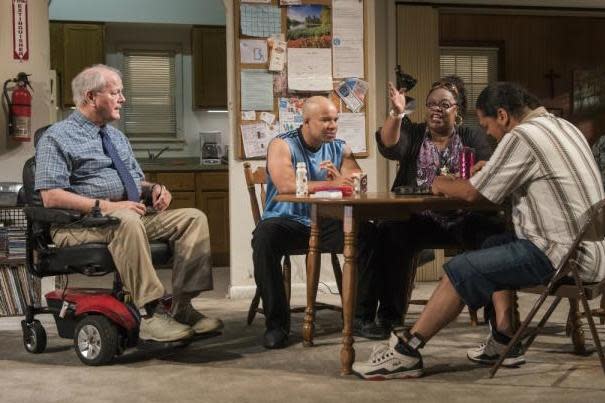Downstate review, Dorfman: Bruce Norris’s studiedly provocative play asks how long we expect a paedophile to suffer for his heinous acts
“No, no I made a mistake,” says the indignant Gio. His “mistake” was statutory rape. From the way he talks, you’d think rape was mom’s-home-cooking compared to the crimes of the other three offenders who have been warehoused in this group home in Illinois. They were found guilty of sex crimes against minors. But Gio is on the same public database that “keeps ya ... in legal purgatory rest of yer f***ing life”.
Bruce Norris’s studiedly provocative play (which is mounted now in the National’s mordantly well-acted co-production, directed by Pam McKinnon, with Chicago’s ace Steppenwolf Company) plunges us into the purgatory of the post-prison paedophile. One foresees indignant letters from people who feel that focusing on such people with clear eyes is an abuse of compassion. Norris’s play is not easy to sit through (given the contentious subject, it would be bizarre if it were) but that’s not because it virtue-signals a bleeding heart liberalism. Far from it: any potentially clammy sequences are wryly, wrenchingly subverted. Someone once asked the musician John Cage what he thought would be the right degree of suffering in the world. He mocked the terms of the question by answering that he thought the degree we have at the moment was “just right”.
By a similar token, Downstate asks how long and to what extent do we expect a paedophile to suffer for his heinous acts, a consideration obviously linked to the length of time society deems it appropriate for the victims to hold onto their suffering. At the start of the play, we see that a man called Andy (played with exactly the right born-again nerves and fervour by Tim Hopper) has come to the house, with his prompting wife, to confront Fred, the piano teacher who raped him when he was 12. Fred (the superb Francis Guinan) is the soul of flustered gentleness in his motorised wheelchair (to which he was confined after a vigilante shooting). Andy talks of taking “ownership” and dismisses the good life he seemingly had beforehand as just a “story he told himself”.
With salutary cunning and insight, Norris makes it damnably difficult to know where to plant a firm foot, in regards to sympathy. Negotiating his play sometimes seemed to me what it would be like trying to race confidently up an escalator designed by Escher. It would be wrong to give away the telling detail that shows how compromised the confrontation is. But just when you think Fred is going to wind up mitigated, if not vindicated, he reaches out to put a hand on Andy. Suddenly, you see the cunning ambiguity of the play’s approach. In humanising the paedophiles, it simultaneously demonstrates how they go about “grooming” their victims.
The acting is excellent throughout. I particularly liked K Todd Freeman as Dee, the flamboyant ex-actor with the willowy “Isadora” arm movements who takes Andy to flirty task for believing that there are things worse than death – “not a lotta cases of death by blowjob”, he jests. The artful dialogue is mined with cant terms from popular sex psychology that are like the crannies into which the bilge water of false thinking and feeling are destined to surge. I admired, rather than liked the play. It’s to its credit that I occasionally wanted it to be over. It’s the first time, watching a piece of this ilk, that my mind has chosen to distract itself by wondering what the “grue” means in gruesome.
To 27 April



